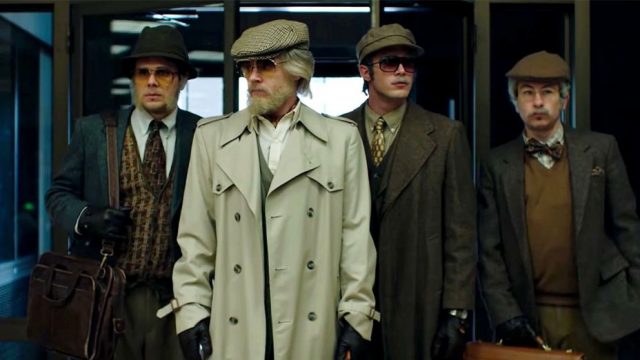American Animals, written and directed by Bart Layton, tells the true story of four Kentucky college students who unsuccessfully, then successfully, and then unsuccessfully again, performed a heist of rare books from the special collections library of the prestigious Transylvania University*, worth several million dollars.
It’s also a movie about the fact that it’s a movie, with interviews with the real perpetrators of the crime intercut with the exploits of their fictionalized selves played by Evan Peters, Barry Keoghan, Blake Jenner, and Jared Abrahamson.
Metafictional touches like the real robbers contradicting each other in their interviews or appearing to their fictional counterparts would’ve seen fresher even just a few years ago, before films like the great Bernie and the smug I, Tonya made applying this approach to true crime stories less novel than the filmmakers likely hope. Still, there are moments of real strength and resonance, especially towards the back half of the film, as the characters and their real life selves deal with the repercussions of their actions.
It is in this second half of the film that the story really starts to distinguish itself. Earlier sections are neither as funny as the premise (freshmen go Ocean’s 11) promises, and there’s a disappointing lack of context and atmosphere for the characters and their environment. In one scene, a character angrily denounces their world as a “disappointment” but there’s really not a sense of their world beyond broad strokes and impressions, and the two robbers other than Barry Keoghan and Evan Peters both feel fairly motiveless in the first half, despite the real guys being there literally to comment on their motives.
In the second half though, the film acquires a real sense of itself as the expected heist movie hijinks turn to paranoia, self-loathing, and PTSD. Evan Peters especially acquits himself in the second half (but throughout the film, really) as the group’s ringleader, a restless, reckless slacker delinquent named Warren.
Layton’s directorial affinity for centered, symmetrical framing gives the story a sense of carefully planned order and cohesion until gradually giving away to a more uncomfortable style, climaxing in a Layla-in-Goodfellas style montage of everything going to shit set to a Leonard Cohen song, that feels simultaneously immaculately crafted and chaotic — the best kind of paradox.
*alma mater of yours truly.

